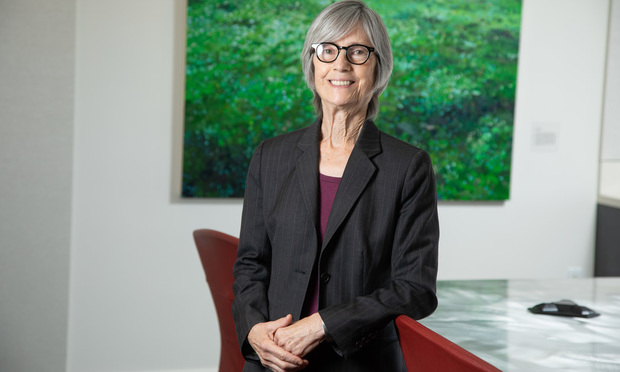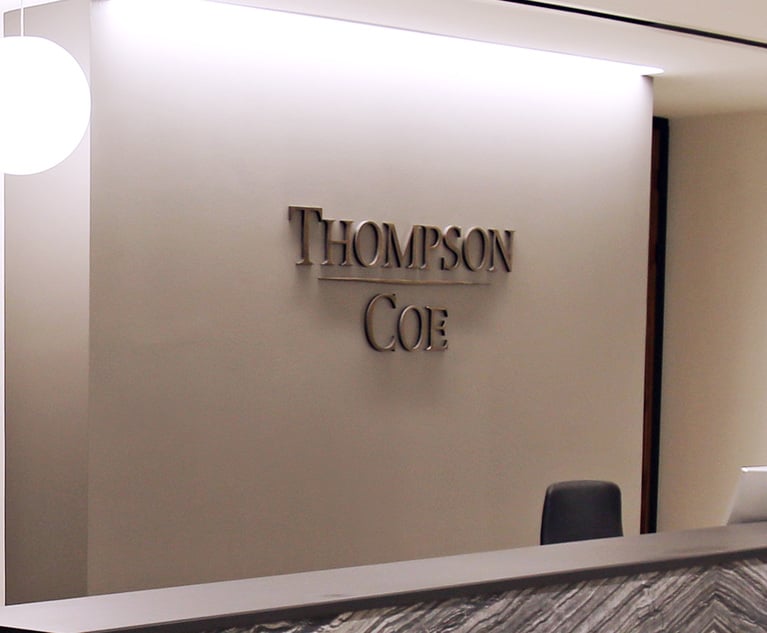Lifetime Achievement: Elizabeth Cabraser, Lieff Cabraser Heimann & Bernstein
Cabraser has spent her career in the courtroom hitting the right notes.
September 09, 2019 at 03:00 PM
4 minute read
 Elizabeth Cabraser of Lieff, Cabraser, Heimann & Bernstein. Credit: Jason Doiy/ALM.
Elizabeth Cabraser of Lieff, Cabraser, Heimann & Bernstein. Credit: Jason Doiy/ALM.
For Elizabeth Cabraser, presenting in the courtroom is like making jazz music.
"You improvise, you listen," she says. "You are making music as you go along."
And Cabraser has spent her career hitting the right notes, winning some of the most challenging and complex cases in the country.
"I watched and listened to the judges more than the lawyers because I realized very early on that I wasn't a typical courtroom lawyer," Cabraser says.
Shy and soft-spoken by nature, Cabraser spends most of her time observing in the courtroom, a strategy that has allowed her to patiently develop effective arguments and beat her opponents—most often men.
"So many times the guys weren't listening, they were just talking, they have prepared outlines, they have prepared arguments, they were going to give those arguments regardless," Cabraser says. "I was willing to improvise. I was willing to be responsive. I was always trying to have a respectful conversation in court."
Over 40-plus years, Cabraser has earned a reputation as a leading plaintiffs attorney for handling complex, high-stakes litigation against Big Tobacco, Big Pharma and Big Oil, including the Exxon Valdez oil spill and the BP Deepwater Horizon industrial disaster. She serves as sole lead counsel and chair of the plaintiffs' steering committee in the Volkswagen and Fiat Chrysler diesel emissions cases.
"She is a lawyer beyond comparison in terms of creativity, intellectual discipline and commitment to the issues that she believes in," New York University School of Law professor Samuel Issacharoff says.
Issacharoff has worked with Cabraser on a number of high-profile cases in the more than 20 years he's known her. He describes Cabraser as "a transformative figure" in mass tort litigation in the United States. But some of his fondest memories of Cabraser have come outside of the courtroom, including sprinting through the airport to catch the last flight out with her.
"For as long as I have known her, I have always tried to get her to allow me to carry some bags for her," Issacharoff says. "In 20 years, she has never allowed me."
Cabraser has only worked at one law firm her entire legal career. She got her first legal job as a law clerk for Robert Lieff, a solo practitioner in Sonoma, California, as the former partner of Melvin Belli was winding up a few cases in preparation to retire to his vineyards.
"My job was getting rid of those cases, so he could work on his winery full time," Cabraser says. "We just never got rid of all the cases because we were there in a little law office in Sonoma, a little town in the wine country."
As people kept coming into the firm with more cases, Cabraser says, she ended up staying with Lieff, eventually becoming a name partner of the firm. Today, Lieff Cabraser Heimann & Bernstein is a 100-attorney operation with offices in San Francisco, New York and Nashville. Lieff, who is now 82, hasn't yet managed to retire.
"In the world of the law firm, we are a very small firm. In the world of plaintiffs-only firms, we are a large firm," Cabraser says. "And there is a reason for that. You can only get so large working on a purely contingency-fee basis and being self-financed."
Cabraser says she intends to keep the firm the same size in the future to preserve its harmony. And she'll keep improvising alongside her colleagues.
"When it's time to take your solo, you take your solo," she says. "It's going to be for four bars only and then you get out of the way and you let somebody else lead."
This content has been archived. It is available through our partners, LexisNexis® and Bloomberg Law.
To view this content, please continue to their sites.
Not a Lexis Subscriber?
Subscribe Now
Not a Bloomberg Law Subscriber?
Subscribe Now
NOT FOR REPRINT
© 2025 ALM Global, LLC, All Rights Reserved. Request academic re-use from www.copyright.com. All other uses, submit a request to [email protected]. For more information visit Asset & Logo Licensing.
You Might Like
View All
KPMG Wants to Provide Legal Services in the US. Now All Eyes Are on Their Big Four Peers



K&L Gates Sheds Space, but Will Stay in Flagship Pittsburgh Office After Lease Renewal
Trending Stories
- 1'It's Not Going to Be Pretty': PayPal, Capital One Face Novel Class Actions Over 'Poaching' Commissions Owed Influencers
- 211th Circuit Rejects Trump's Emergency Request as DOJ Prepares to Release Special Counsel's Final Report
- 3Supreme Court Takes Up Challenge to ACA Task Force
- 4'Tragedy of Unspeakable Proportions:' Could Edison, DWP, Face Lawsuits Over LA Wildfires?
- 5Meta Pulls Plug on DEI Programs
Who Got The Work
Michael G. Bongiorno, Andrew Scott Dulberg and Elizabeth E. Driscoll from Wilmer Cutler Pickering Hale and Dorr have stepped in to represent Symbotic Inc., an A.I.-enabled technology platform that focuses on increasing supply chain efficiency, and other defendants in a pending shareholder derivative lawsuit. The case, filed Oct. 2 in Massachusetts District Court by the Brown Law Firm on behalf of Stephen Austen, accuses certain officers and directors of misleading investors in regard to Symbotic's potential for margin growth by failing to disclose that the company was not equipped to timely deploy its systems or manage expenses through project delays. The case, assigned to U.S. District Judge Nathaniel M. Gorton, is 1:24-cv-12522, Austen v. Cohen et al.
Who Got The Work
Edmund Polubinski and Marie Killmond of Davis Polk & Wardwell have entered appearances for data platform software development company MongoDB and other defendants in a pending shareholder derivative lawsuit. The action, filed Oct. 7 in New York Southern District Court by the Brown Law Firm, accuses the company's directors and/or officers of falsely expressing confidence in the company’s restructuring of its sales incentive plan and downplaying the severity of decreases in its upfront commitments. The case is 1:24-cv-07594, Roy v. Ittycheria et al.
Who Got The Work
Amy O. Bruchs and Kurt F. Ellison of Michael Best & Friedrich have entered appearances for Epic Systems Corp. in a pending employment discrimination lawsuit. The suit was filed Sept. 7 in Wisconsin Western District Court by Levine Eisberner LLC and Siri & Glimstad on behalf of a project manager who claims that he was wrongfully terminated after applying for a religious exemption to the defendant's COVID-19 vaccine mandate. The case, assigned to U.S. Magistrate Judge Anita Marie Boor, is 3:24-cv-00630, Secker, Nathan v. Epic Systems Corporation.
Who Got The Work
David X. Sullivan, Thomas J. Finn and Gregory A. Hall from McCarter & English have entered appearances for Sunrun Installation Services in a pending civil rights lawsuit. The complaint was filed Sept. 4 in Connecticut District Court by attorney Robert M. Berke on behalf of former employee George Edward Steins, who was arrested and charged with employing an unregistered home improvement salesperson. The complaint alleges that had Sunrun informed the Connecticut Department of Consumer Protection that the plaintiff's employment had ended in 2017 and that he no longer held Sunrun's home improvement contractor license, he would not have been hit with charges, which were dismissed in May 2024. The case, assigned to U.S. District Judge Jeffrey A. Meyer, is 3:24-cv-01423, Steins v. Sunrun, Inc. et al.
Who Got The Work
Greenberg Traurig shareholder Joshua L. Raskin has entered an appearance for boohoo.com UK Ltd. in a pending patent infringement lawsuit. The suit, filed Sept. 3 in Texas Eastern District Court by Rozier Hardt McDonough on behalf of Alto Dynamics, asserts five patents related to an online shopping platform. The case, assigned to U.S. District Judge Rodney Gilstrap, is 2:24-cv-00719, Alto Dynamics, LLC v. boohoo.com UK Limited.
Featured Firms
Law Offices of Gary Martin Hays & Associates, P.C.
(470) 294-1674
Law Offices of Mark E. Salomone
(857) 444-6468
Smith & Hassler
(713) 739-1250










